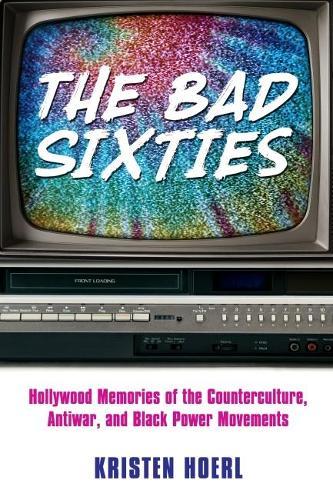Overview
Ongoing interest in the turmoil of the 1960s clearly demonstrates how these social conflicts continue to affect contemporary politics. In The Bad Sixties: Hollywood Memories of the Counterculture, Antiwar, and Black Power Movements, Kristen Hoerl focuses on fictionalized portrayals of 1960s activism in popular television and film. Hoerl shows how Hollywood has perpetuated politics deploring the detrimental consequences of the 1960s on traditional American values. During the decade, people collectively raised fundamental questions about the limits of democracy under capitalism. But Hollywood has proved dismissive, if not adversarial, to the role of dissent in fostering progressive social change. Film and television are salient resources of shared understanding for audiences born after the 1960s because movies and television programs are the most accessible visual medium for observing the decade's social movements. Hoerl indicates that a variety of television programs, such as Family Ties, The Wonder Years, and Law and Order, along with Hollywood films, including Forrest Gump, have reinforced images of the """"bad sixties."""" These stories portray a period in which urban riots, antiwar protests, sexual experimentation, drug abuse, and feminism led to national division and moral decay. According to Hoerl, these messages supply distorted civics lessons about what we should value and how we might legitimately participate in our democracy. These warped messages contribute to """"selective amnesia,"""" a term that stresses how popular media renders radical ideas and political projects null or nonexistent. Selective amnesia removes the spectacular events and figures that define the late-1960s from their motives and context, flattening their meaning into reductive stereotypes. Despite popular television and film, Hoerl explains, memory of 1960s activism still offers a potent resource for imagining how we can strive collectively to achieve social justice and equality.
Full Product Details
Author: Kristen Hoerl
Publisher: University Press of Mississippi
Imprint: University Press of Mississippi
Weight: 0.430kg
ISBN: 9781496817235
ISBN 10: 1496817230
Pages: 192
Publication Date: 30 June 2018
Audience:
Professional and scholarly
,
Professional & Vocational
Format: Hardback
Publisher's Status: Active
Availability: Manufactured on demand

We will order this item for you from a manufactured on demand supplier.
Reviews
While some sixties radicals demanded 'all power to the imagination, ' Kristen Hoerl shows that Hollywood's imagination too often aligns with the powerful. This smart look at three decades of film and TV representations demonstrates the lasting influence of late sixties social and cultural movements. Her close read of the culture industry's selective amnesia reminds us that the future is often decided on the terrain of memory.--Dan Berger, author of Captive Nation: Black Prison Organizing in the Civil Rights Era The Bad Sixties is a timely and important intervention into the contemporary literature about the representational politics of social movement politics and counterculture in the Long Sixties. Hoerl provides a lively and entertaining discussion of the sixties after they ended and a smart and engaging assessment of their circulation in the eighties as neoconservative culture undermined the representational power of their political edge.--Lisa M. Corrigan, author of Prison Power: How Prison Influenced the Movement for Black Liberation
The Bad Sixties is a timely and important intervention into the contemporary literature about the representational politics of social movement politics and counterculture in the Long Sixties. Hoerl provides a lively and entertaining discussion of the sixties after they ended and a smart and engaging assessment of their circulation in the eighties as neoconservative culture undermined the representational power of their political edge. --Lisa M. Corrigan, associate professor of communication and director of the gender studies program, University of Arkansas; author of Prison Power: How Prison Influenced the Movement for Black Liberation; and cohost of the podcast Lean Back: Critical Feminist Conversations While some sixties radicals demanded 'all power to the imagination, ' Kristen Hoerl shows that Hollywood's imagination too often aligns with the powerful. This smart look at three decades of film and TV representations demonstrates the lasting influence of late sixties social and cultural movements. Her close-read of the culture industry's selective amnesia reminds us that the future is often decided on the terrain of memory. --Dan Berger, author of Captive Nation: Black Prison Organizing in the Civil Rights Era
The Bad Sixties is a timely and important intervention into the contemporary literature about the representational politics of social movement politics and counterculture in the Long Sixties. Hoerl provides a lively and entertaining discussion of the sixties after they ended and a smart and engaging assessment of their circulation in the eighties as neoconservative culture undermined the representational power of their political edge. --Lisa M. Corrigan, author of Prison Power: How Prison Influenced the Movement for Black Liberation While some sixties radicals demanded 'all power to the imagination, ' Kristen Hoerl shows that Hollywood's imagination too often aligns with the powerful. This smart look at three decades of film and TV representations demonstrates the lasting influence of late sixties social and cultural movements. Her close read of the culture industry's selective amnesia reminds us that the future is often decided on the terrain of memory. --Dan Berger, author of Captive Nation: Black Prison Organizing in the Civil Rights Era
Author Information
Kristen Hoerl, Lincoln, Nebraska, is associate professor of communication studies at the University of Nebraska-Lincoln. Hoerl is editor of Women's Studies in Communication and has published in such journals as Communication and Critical/Cultural Studies, the Quarterly Journal of Speech, Critical Studies in Media Communication, and Communication, Culture & Critique.




